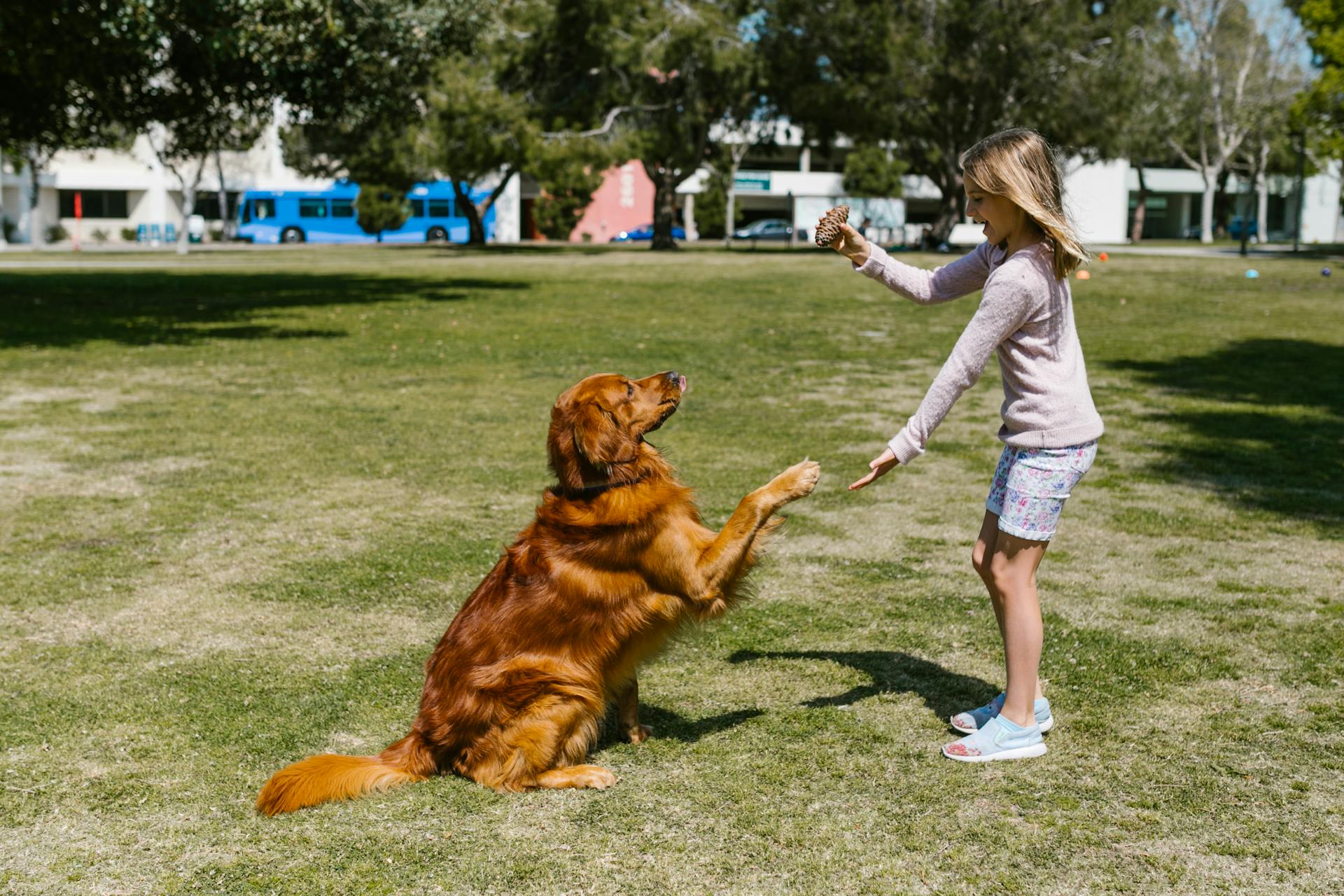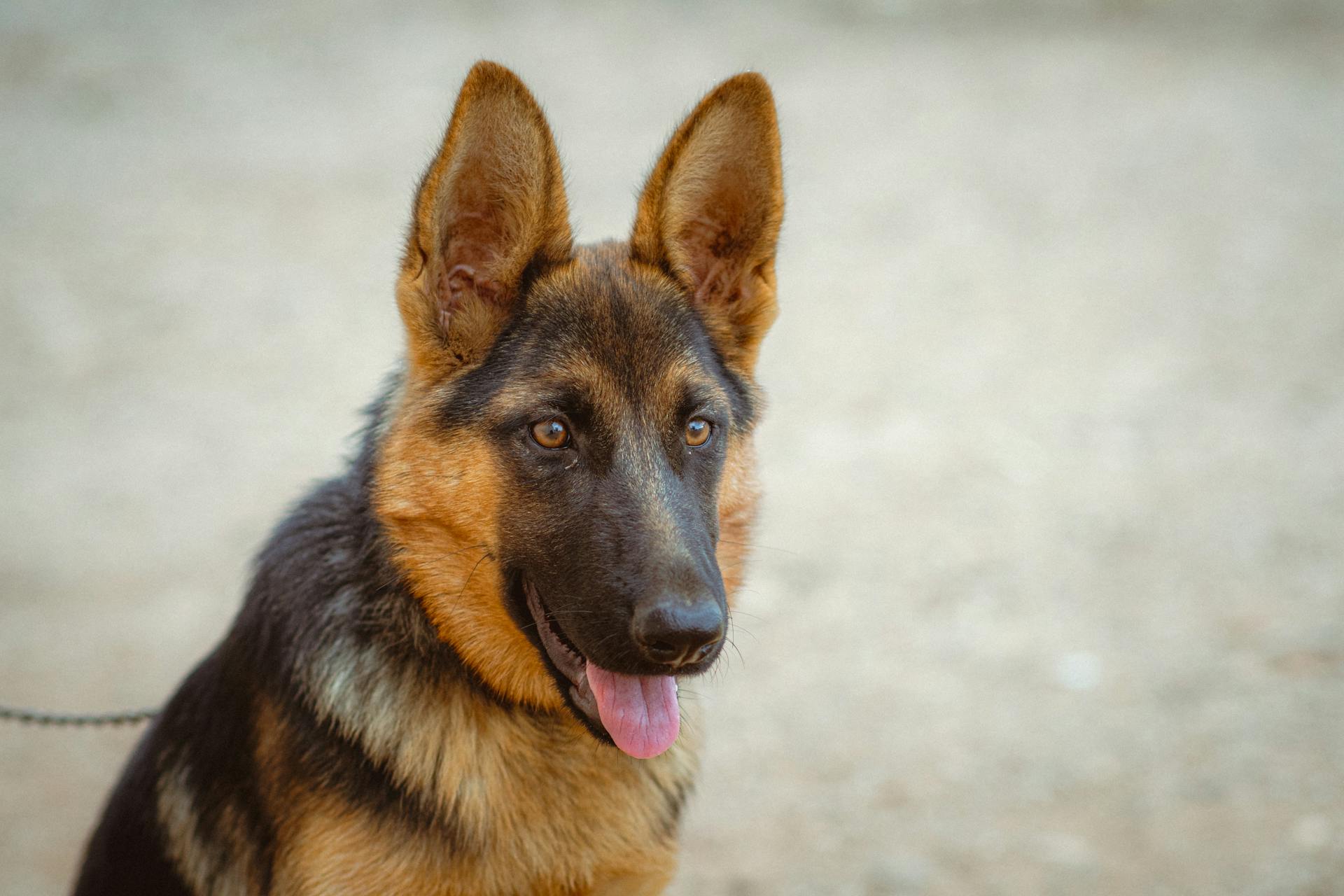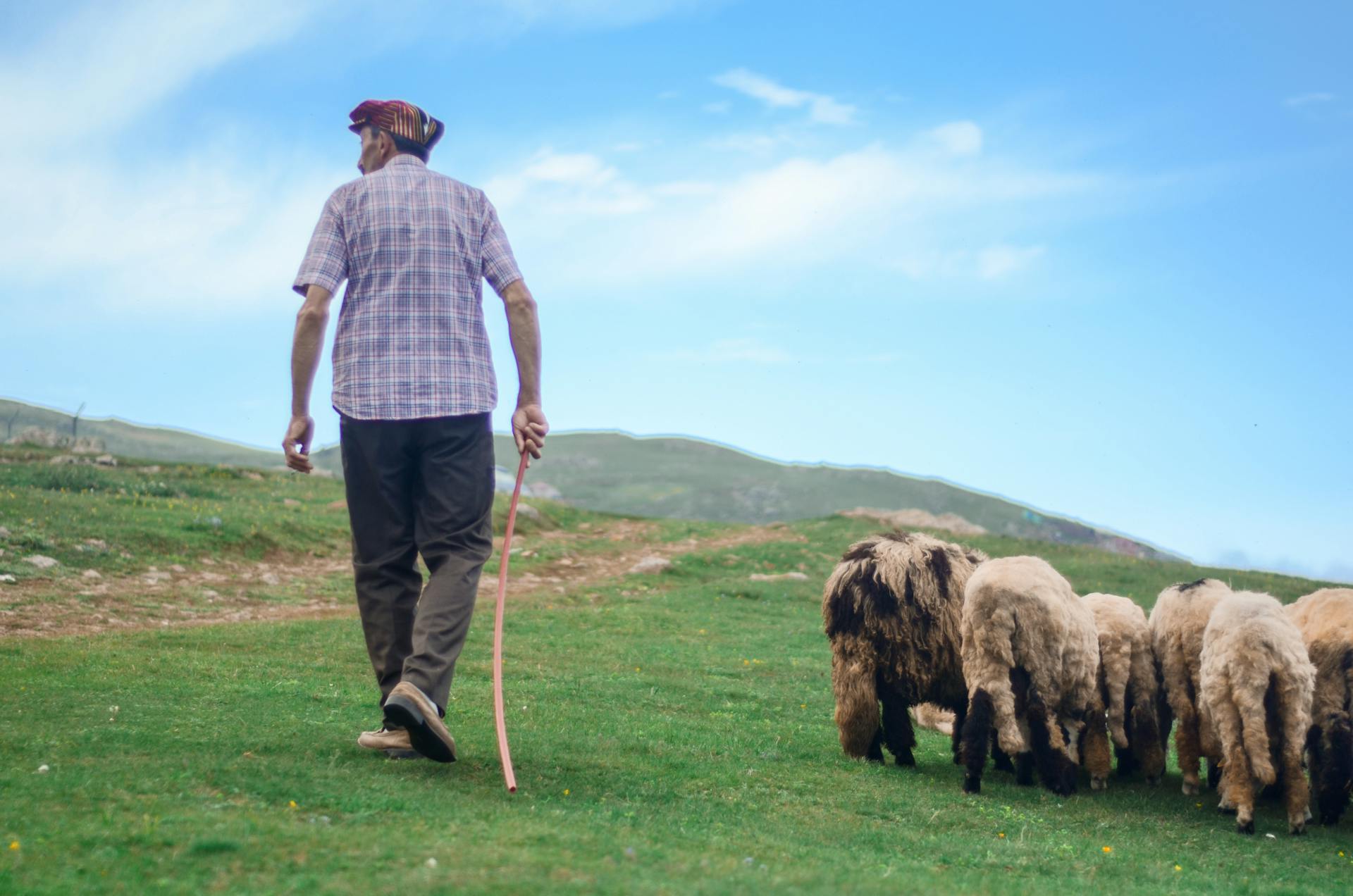
The Sarplaninac dog breed is a rare and ancient breed from the Balkan Peninsula. They originated in the mountainous regions of Albania, Kosovo, and Macedonia.
Their original purpose was to guard livestock and protect their families from predators. The Sarplaninac's strong instinct for guarding and herding is still present today.
The Sarplaninac is a medium to large-sized dog, typically weighing between 77-110 pounds. Their height ranges from 24-27 inches at the shoulder.
Their thick coat is a mix of gray, black, and white, with a distinctive white blaze on the forehead. The Sarplaninac's coat requires regular grooming to prevent matting and tangling.
A different take: Sarplaninac Pups
Health and Care
The Sarplaninac's coat is a thick and dense undercoat that requires regular grooming to prevent matting and tangling. Brush your Sarplaninac with a coarse comb or a long-hair brush in the spring when the coat change is due.
Bathing your Sarplaninac should be done only in emergencies, as it can damage the natural protective layer of the skin. This is because the coat is extremely water-repellent, which is beneficial in its original climate.
Worth a look: Dogs Breeds That Start with B
Regular dental care is essential for your Sarplaninac's health. Brush your dog's teeth regularly with a dog toothbrush and dog toothpaste.
Checking your dog's ears regularly is also crucial. You can wipe them clean with a damp cloth or use a special ear cleaner for dogs.
After every walk, especially in nature, check your dog for ticks and remove any dirt from the coat. This will help prevent parasites and keep your dog clean.
Origin and History
The Sarplaninac's origins are rooted in the Šar Planina mountain range in the former Yugoslavia, where it was bred in the early 19th century.
The breed's name is a direct reference to this region, and its history dates back to a time when there was no uniform breed standard.
The Sarplaninac was initially known as the Illyrian Shepherd Dog and wasn't recognized by the FCI until the end of the 1930s.
It wasn't until 1956 that the breed officially bore the name Sarplaninac and was listed under this name in the FCI breed standard.
The breed has a rich history of serving as a guard dog, and its qualities as a protective colossus have made it a valuable asset in various roles, including as a guard and protection dog for the police and military.
Additional reading: What Is Dog Sledding Called
Breed Group
The Sarplaninac's breed group is a fascinating topic.
The Sarplaninac is actually a type of shepherd dog, specifically a member of the Shepherd breed group.
If you're curious about your dog's breed group, you can check out Wisdom Panel's DNA tests.
The Sarplaninac's origins are rooted in the Balkans, where it was bred to herd livestock.
Suggestion: Sarplaninac Temperament
Origin and History
The Šar Planina mountain range in the former Yugoslavia is the original home of the Sarplaninac breed. It lies between Kosovo and North Macedonia.
The breeding and spread of the breed dates back to the beginning of the 19th century, but there was no uniform breed standard at that time. The Kaski Ovcar breed from Kosovo was also incorrectly referred to as the Sarplaninac.
The breed was not recognized by the FCI until the end of the 1930s, when it was still known as the Illyrian Shepherd Dog. The breed has officially borne the name Sarplaninac since 1956.
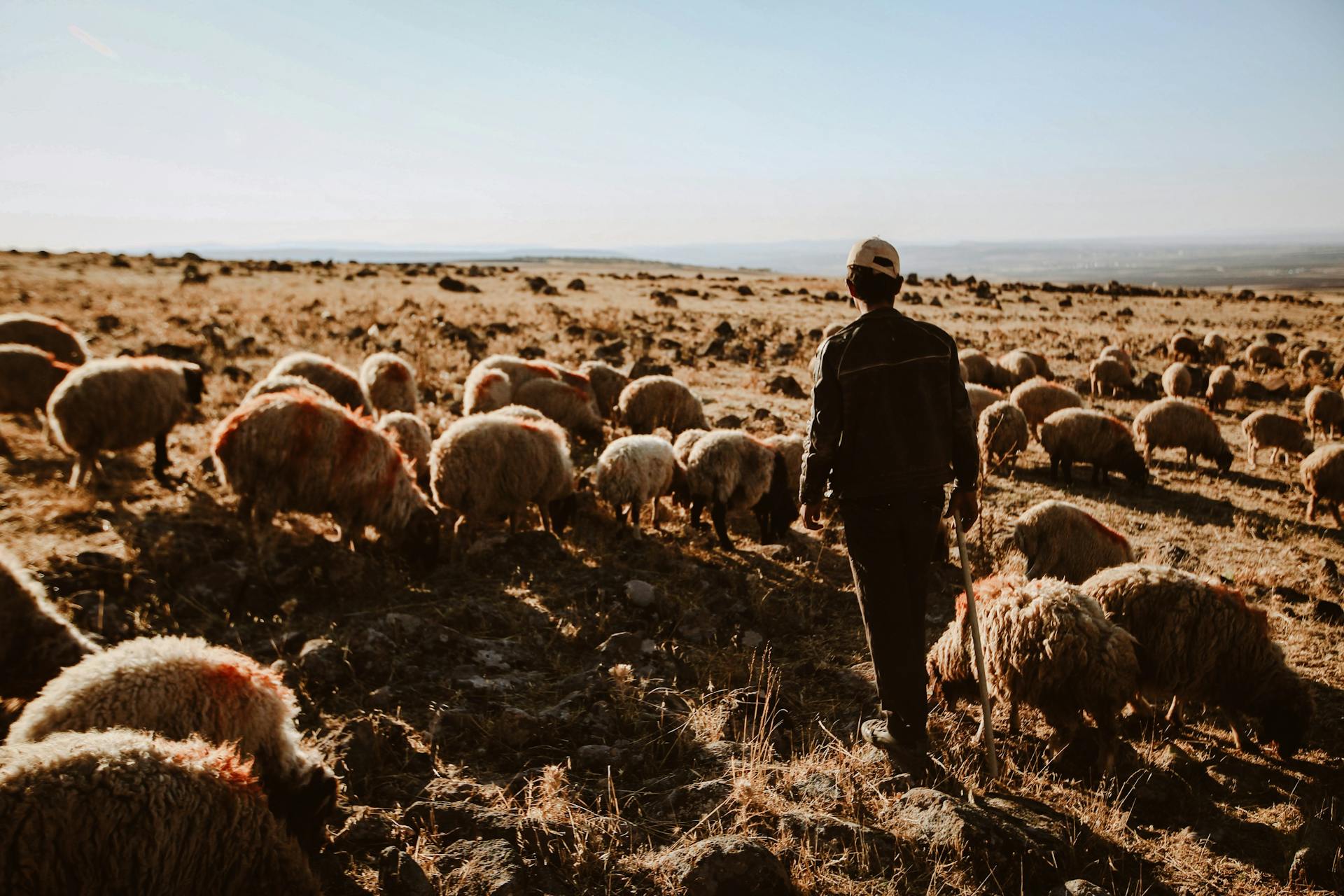
The Sarplaninac has been used as a guard dog, and it's increasingly used as a guard and protection dog by the police and military. It proves its qualities as a protective colossus in these roles.
A famous representative of the Sarplaninac is "Lex", the loyal dog of Yugoslavian Marshal Tito. Lex saved his master's life by discovering a strange package that turned out to be a bomb.
In the southern Balkans, the Sarplaninac was traditionally used to guard cattle or sheep. It was an essential part of the transhumant system of management, where livestock was moved twice a year.
The Fédération Cynologique Internationale recognized the breed as a Yugoslav breed in 1939, under the name 'Ilirski Ovčar' or 'Illyrian Shepherd Dog'. In 1957, the Fédération Cynologique Internationale agreed to change the official international names of the breed to 'Jugoslovenski Ovcarski Pas – Sarplaninac' and 'Yugoslavian Shepherd Dog – Sharplanina'.
The Šarplaninac is found mainly in the Šar Mountains, where it is thought to have originated. It is also distributed in the areas of the Jablanica, Korab, and Pelister mountains.
If this caught your attention, see: Breeds of Dogs That Start with D
They Are National Symbols
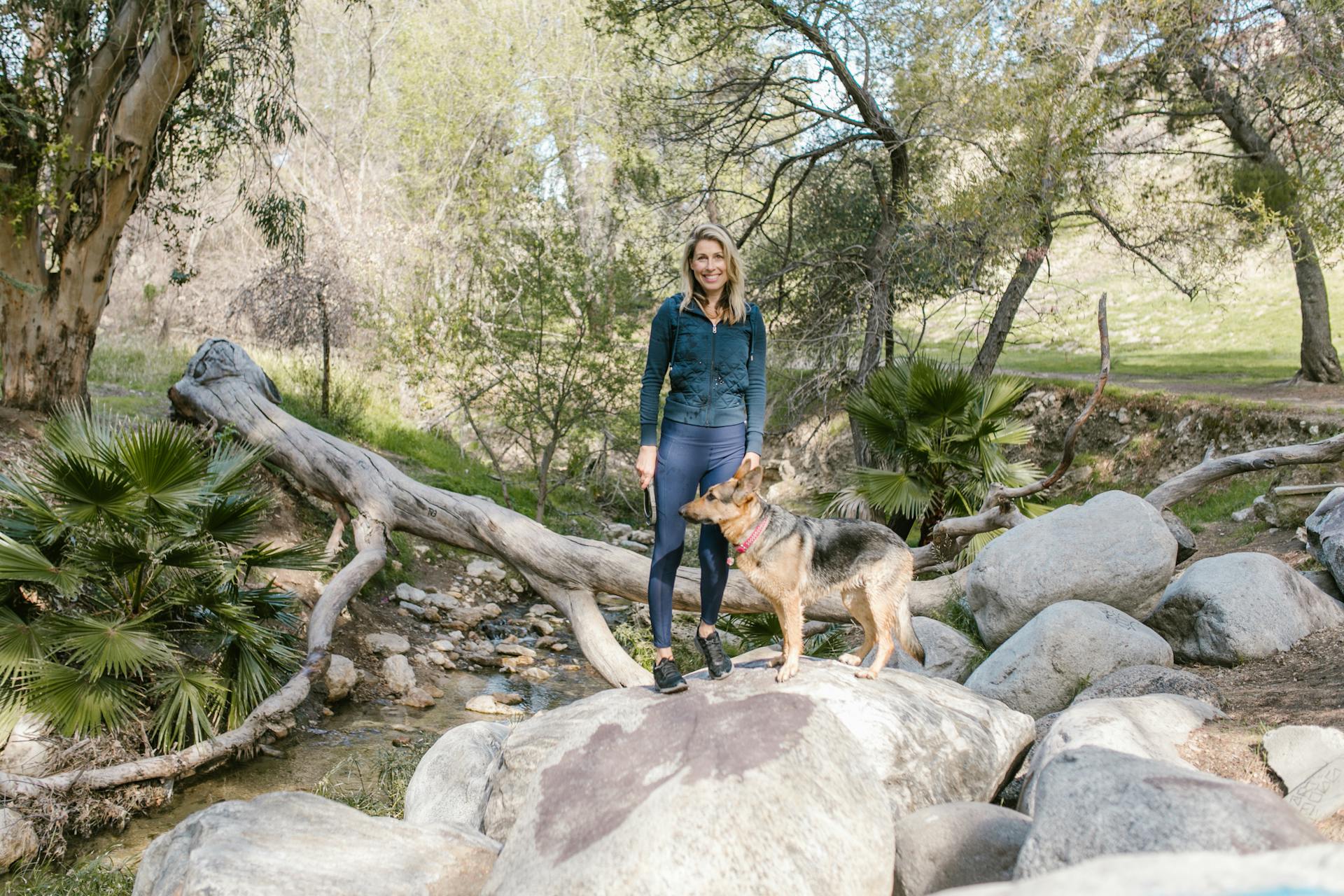
The Sarplaninac holds a special place in the hearts of the people of Macedonia, where it's considered a national symbol of pride. The breed is featured on the official currency, the Denar coin.
In fact, the Sarplaninac is an emblem of a small town called “Town of Dragas,” which lies in the Prizen District of Kosovo.
Temperament & Intelligence
The Sarplaninac is a calm and fearless dog, but it's not overly affectionate. They can form strong bonds with their owners, but it takes time.
They are independent thinkers and can be a bit stubborn, which means they need consistent and firm training from the start. With the right approach, they can be well-mannered and intelligent.
Sarplaninacs are not excessive barkers, but they will bark to alert you to potential danger or while guarding and herding livestock. They are also diggers, and they dig holes when temperatures rise to stay cool.
They are strong dogs who need an owner with the strength to control them, especially on a leash. They are wary of strangers but are calm most of the time.
Recommended read: Are Portuguese Water Dogs Good for First Time Owners
The Sarplaninac's nature is typical of a shepherd dog, and they face up to dangers that threaten their herd or family. They make independent decisions and can be headstrong, even with proper training.
They need a task that corresponds to their urge to move and keeps them mentally occupied. Long walks and "brain teasers" are an absolute must for this breed.
With patience and dedication, you can teach the Sarplaninac to follow commands and become a well-mannered family dog. They require an experienced trainer with a firm hand and the ability to establish dominance.
Owning a Sarplaninac
They make wonderful family companions with the right, experienced owner.
Supervision is recommended with small children due to their medium to large size.
They are excellent watchdog and guard dogs, as they are fearless and extremely protective of their flock.
It's best to have a large, fenced yard with plenty of room for these dogs to run, especially if you live on a farm or in a rural area.
They require an experienced trainer with a firm hand and the ability to establish dominance.
Suggestion: Munsterlander Large
Owning a Dog
The Sarplaninac makes a wonderful family companion with the right, experienced owner.
Supervision is recommended with small children, considering their medium to large size.
They are excellent watchdog and guard dogs, as they are fearless and extremely protective of their flock.
These dogs are headstrong, and even with proper training, they may ignore commands if they feel the need to override your command.
It's best to have a large, fenced yard with plenty of room for these dogs to run.
They are not suitable for apartment life due to their medium size and desire to have a job to do.
With patience and dedication, you can teach the Sarplaninac to follow commands and become a well-mannered family dog.
They require an experienced trainer with a firm hand and the ability to establish dominance.
Readers also liked: Large Mountain Dogs
Suitable Accessories
Owning a Sarplaninac requires attention to detail, especially when it comes to accessories. A soft, sturdy collar and lead are essentials for this breed.
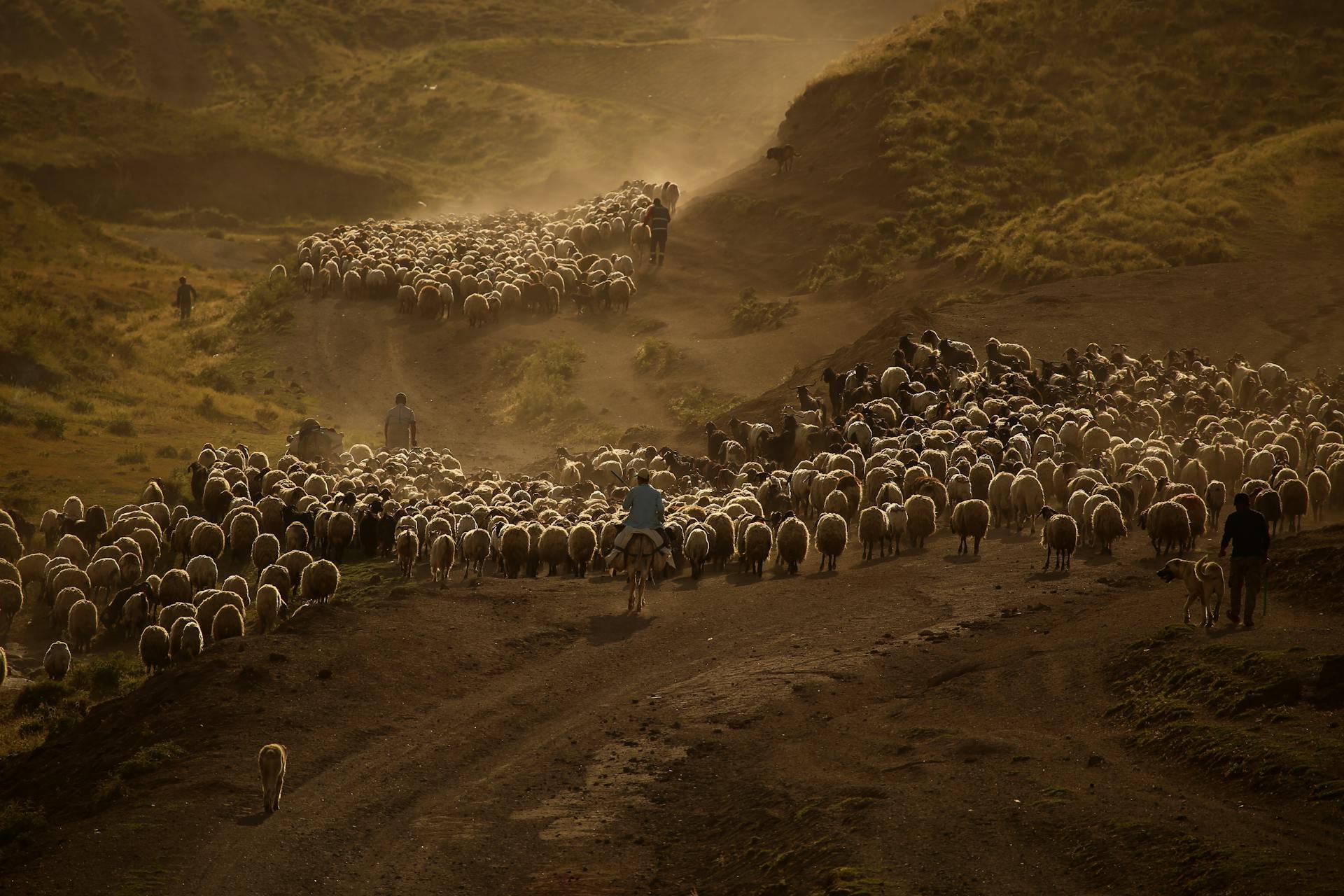
To keep your Sarplaninac's coat in good condition, you'll need a small assortment of brushes and combs for grooming. This will help prevent matting and tangling.
A Sarplaninac doesn't need much, but it does require regular grooming. Plenty of time for this is essential.
Other basic equipment for any dog includes water and food bowls, tick tweezers, claw clippers, dog toothbrush and cream. These are must-haves for any dog owner.
Transport grids for car travel and a first aid kit are also crucial. It's best to ask your vet what should be in the first aid kit.
Suggestion: Dog Breeds That Don't Need Grooming
Frequently Asked Questions
What is Sarplaninac in english?
The Šarplaninac is a large shepherd dog breed originating from the Balkan region, specifically from the Šar mountains. It's also known as the Sharplaninec, a name that reflects its Eastern European heritage.
Do Sarplaninac dogs shed?
Yes, Sarplaninac dogs shed, but regular brushing can help manage their thick double-coat.
Are Sarplaninac good with other dogs?
Sarplaninacs are generally good with other dogs if raised together, but may not accept them if unaccustomed. Socialization with other dogs from an early age is key to a harmonious household.
What is the national dog of Macedonia?
The Sarlaninec, also known as the Macedonian mountain dog, is a large breed originating from the Balkan Peninsula. This ancient breed is a testament to the rich canine heritage of Macedonia.
Are Sarplaninac dogs aggressive?
Sarplaninac dogs can be prone to canine aggression towards unknown dogs, but their aggression is generally directed towards protecting their family and territory, not people
Featured Images: pexels.com
